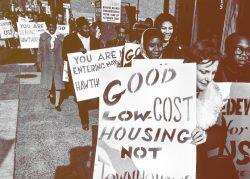The $330 billion for housing in the Build Back Better reconciliation bill, which would be an unprecedented investment, might be one of the first items cut as Congress tries to shrink the price tag.
According to multiple reports, lawmakers are looking at slashing these funds to appease moderate Democrats who consider the $3.5 trillion package too expensive. Debate over the bill has held up passage of a $1.2 trillion infrastructure plan.
The funds include $90 billion in rental assistance, of which $75 billion would be dedicated to housing choice vouchers. It also includes an $80 billion investment in public housing, which could cover the whopping $40 billion in repairs needed across the New York City Housing Authority’s portfolio. It also creates financial incentives for cities to combat exclusionary zoning.
Housing advocates have some confidence that funding for public housing may be safer than other money in the spending bill. Senate Majority Leader Chuck Schumer has made clear that at least $80 billion must be allocated to public housing.
“We’ve heard the rest is at dire risk of being eliminated from the bill,” said Rachel Fee, executive director of the New York Housing Conference.
Her organization penned a letter calling on Schumer and the New York congressional delegation to preserve the funding. The letter was signed by more than 100 groups.
Read more


The spending package also includes long-sought reforms to the Low-Income Housing Tax Credit program. Among them is a change to the so-called 50 percent test, which requires at least half of a development to be financed through private activity bonds to be eligible for the tax credits. That threshold would temporarily be lowered to 25 percent.
In a letter to her Democratic colleagues, House Speaker Nancy Pelosi identified three areas that Congress must focus on in President Joe Biden’s Build it Back Better bill: climate change, health care and child care. Some have taken this as a sign that housing is not a priority, though the letter also mentions “advancing housing initiatives that are resilient and green.”
The idea of reducing housing funding fails to recognize that “you need stable housing for all the other social spending to work,” Fee said.
Cea Weaver, who coordinates the Housing Justice for All coalition in New York and co-wrote an op-ed in Politico this week about potential cuts, said there is “no accountability” on the federal level when it comes to housing policy. She said voters typically look to local governments to address their housing needs, so federal lawmakers feel less pressure to deliver on large-scale investments.
The funding contemplated as part of the reconciliation bill is significantly smaller than what Biden initially proposed. It included enough money to make housing vouchers universal — that is, available to everyone who is eligible. Failure to pass even a pared-down version would make further investment that much more difficult, Weaver said.
“Right now is our window,” she said.
